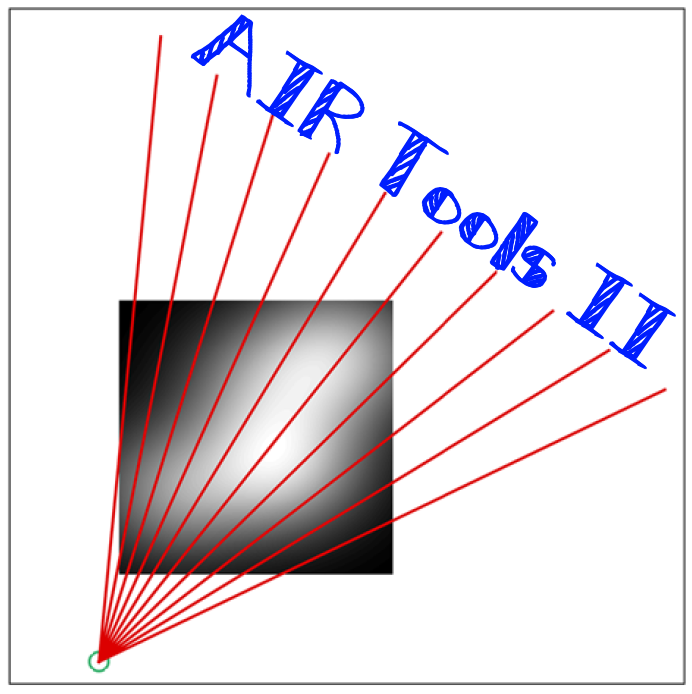AIR Tools II
AIR Tools II, Version 1.0
A MATLAB Package of Algebraic Iterative
Reconstruction Methods, Improved Implementation
(for Matlab Version 9.0 or later)
To download this software package go to:
where we maintain the software.
It is distributed under the 3-Clause BSD License
(a license file iw provided as part of the package).
The package and the algorithms are described in the paper:
-
P. C. Hansen and J. S. Jørgensen,
AIR Tools II: Algebraic Iterative Reconstruction Methods,
Improved Implementation, Numerical Algorithms, 79 (2018), pp. 107-137.
doi:10.1007/s11075-017-0430-x.
|

|
This MATLAB package provides efficient, robust and flexible implementations
of algebraic iterative reconstruction (AIR) methods for computing
regularized solutions to discretizations of inverse problems, such as
computed tomography.
All our methods are equipped with stopping rules as well as heuristics for
computing a good relaxation parameter, and we also provide several test problems
from tomography.
The package is intended for users who want to experiment with algebraic
iterative methods and their convergence properties.
The software is a much expanded and improved version of the package AIR
Tools from 2012, based on a new modular design.
In addition to improved performance and memory use, we provide more
flexible iterative methods, a column-action method, new test problems, new demo
functions and - perhaps most important - the ability to use
function handles
The package includes some of the most common Algebraic Iterative
Reconstruction (AIR) methods, divided into three classes.
- ART: algebraic reconstruction technique.
Methods that sequentially involve one row at a time.
The original algorithm is due to Kaczmarz; the name ART originates from the
seminal paper by Gordon, Bender and Herman.
- CART: column-action reconstruction technique.
Methods that sequentially involve one column at a time; these methods are
sometimes referred to as column-relaxation methods.
- SIRT: simultaneous iterative reconstruction technique.
Methods that simultaneously involve all the rows at a time, and therefore
are based on matrix multiplications.
For all methods we provide several strategies for choosing the
relaxation parameter as well as several stopping rules.
The relaxation parameter can be fixed, or chosen adaptively
in each iteration; in the former case we provide a "training"
algorithm that finds the optimal parameter for a given problem.
The stopping rules provided are the discrepancy principle,
the monotone error rule, and the NCP criterion; for the
first two methods "training" can be used to finde the
optimal discrepancy parameter.
The package also includes seven test problems from tomography.
The function phantomgallery can generate
a number of random phantomes:

A partial translation of AIR Tools II to Fortran
is available from GitHub:
FAIRtools.
The original work was carried out as part of the project CSI: Computational
Science in Imaging, funded by the Danish Research Council for
Technology and Production Sciences.
The present version was developed during the project
High-Definition
Tomography, funded by an ERC Advanced Research Grant.
A course that uses this package (as well as
Regularization Tools)
can be found at this page:
The Original Software
The old version of the software, called AIR Tools, will not be maintained.
It is still available here:
Software Dedicated to Computed Tomography
AIR Tools II contains generel-purpose software for linear inverse problems.
Dedicated software packages for computed tomography are, e.g.:
- The ASTRA Toolbox, a MATLAB
and Python toolbox of high-performance GPU primitives for 2D and 3D
tomography.
- SNARK14, a
programming system for the reconstruction of 2D images from 1D projections.
- TIGRE, a tomographic iterative
GPU-based reconstruction toolbox.


